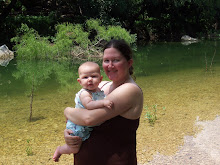Happy Spring! Today is the Vernal Equinox, where day stands in equal balance with night, signaling the coming light and approach of Spring. It is a time of fertility, which here in Austin is abundantly clear by all of the verdant, budding trees and the first appearances of bluebonnets and wildflowers. It is a time for reflection, but also for renewal. As the earth rebirths itself, we rebirth our wintery, sleepy selves, and hopefully emerge with a newfound lightness and youthful spring in our step.
As the holiday weekend approaches, I'm reminded of discussions last year with Aaron about his unwillingness to celebrate yet another holiday stolen by the mass merchandising of material non-necessities. My off the beaten path knowledge of history and interest in mythology was useful in this instance and, keeping with the power flow of the season, I wanted to remind myself and share with you all the real historical and sacred roots of this, my favorite time of the seasonal wheel. So if any of you are wondering where the word 'Easter' came from and why there are chocolate bunnies and coloring eggs, this is for you! Enjoy.
In ancient times, there were many sacred celebrations which honored Mother Goddesses who ruled over Spring, rebirth, fertility, and the moon. Sheelah-Na-Gig in Ireland, Isis in Egypt, Astarte in Canaan, Demeter/Kore (Persephone) in Greece, Luna in Rome, and Eostre among the Germanic tribes, are but a few of many. Women, men and children gathered to celebrate this magical time with festivals of flowers and dancing, and began gifting tokens that symbolized the vital, fertile world around them such as colored eggs, rabbits, and specially spiced cakes.
The word easter is derived from the Old English eastre, which is from the Old High German ostara, originally meaning 'nearest to the east'. The name for the holiday of Easter is believed to be a by-product of the clash of religions between Christians, and the Germanic tribes of England, who celebrated at the vernal equinox the Goddess Eostre, whose name shows that she was originally the dawn-goddess.
(etymological information from the Oxford English Dictionary).
And here some additional links for more detailed info:
* You Call it Easter, We Call it Ostara by Peg Aloi, a raised Catholic, modern Neo-Pagan
* Ostara by Kveldulf Hagan Gundarsson and Gunnora Hallakarva
* Ostara aka the Vernal Equinox
* Ostara's Home Page edited by D.L. Ashlimann of Pittsburgh University, and containing links to more info about German mythology
* Ostara- Goddess of Renewal for ritual advice and altar recommendations
Merry reading and Goddess Bless!
Relish Austin has moved!
12 years ago

No comments:
Post a Comment